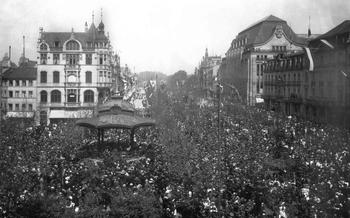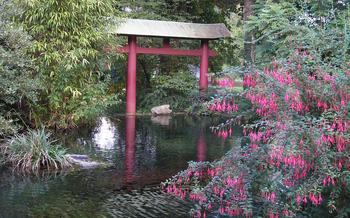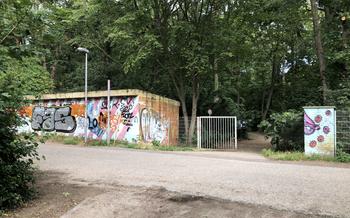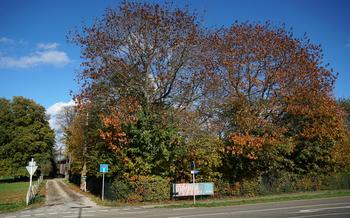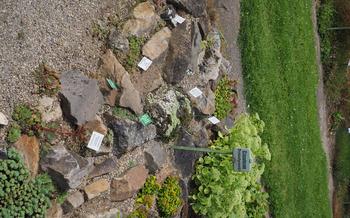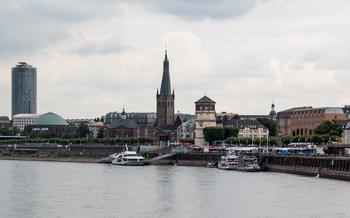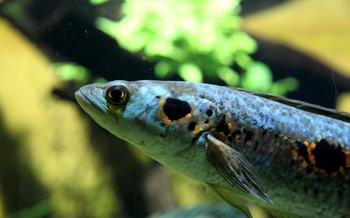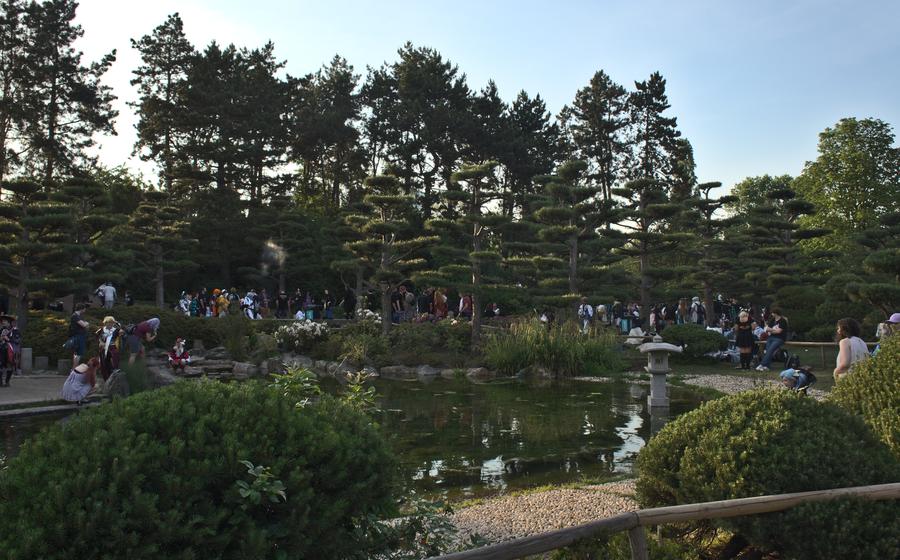
Japanese Garden in Nordpark
- Nordpark: A Haven of Tranquility in the Heart of Düsseldorf
- Symbolism and Elements: Unveiling the Deeper Meanings
- Seasonal Delights: Experiencing the Garden Throughout the Year
- Cultural Events and Workshops: Immerse Yourself in Japanese Traditions
- Zen Garden: Finding Inner Peace Through Simplicity
- Bonsai Collection: Miniature Masterpieces of Nature
- Children's Playground: A Place for Joy and Exploration
- Photography Opportunities: Capturing the Garden's Essence
- Accessibility and Facilities: Ensuring a Comfortable Visit
- Guided Tours: Unveiling the Garden's Secrets
- Souvenirs and Gifts: Taking a Piece of Japan Home
- Visiting Tips: Making the Most of Your Experience
- Insider Tip: Hidden Gems to Discover
Nordpark: A Haven of Tranquility in the Heart of Düsseldorf
Amidst the vibrant cityscape of Düsseldorf, Nordpark stands as an oasis of tranquility, inviting visitors to escape the hustle and bustle of urban life. This sprawling green space, covering an area of 170 hectares, boasts a diverse range of attractions, including the renowned Japanese Garden. Nordpark's rich history dates back to 1937, when it was conceived as part of a comprehensive urban development plan. Today, it serves as a vital green lung for the city, offering a sanctuary for both locals and tourists alike.
The park's convenient location, just a short distance from the city center, makes it easily accessible by public transportation or on foot. Visitors are greeted by a picturesque landscape of rolling hills, tranquil ponds, and lush greenery. Nordpark is also home to the Aquazoo Löbbecke Museum, a renowned aquarium showcasing a vast array of marine life from around the world. Whether you seek a leisurely stroll, a fun-filled family outing, or a moment of serene contemplation, Nordpark has something to offer everyone.
Symbolism and Elements: Unveiling the Deeper Meanings
The Japanese Garden in Nordpark is not merely a collection of plants and structures; it is a carefully crafted space imbued with deep symbolism and meaning. Each element, from the stones and water to the plants and structures, has been thoughtfully placed to create a harmonious and contemplative environment.
Stones: Stones play a significant role in Japanese gardens, representing stability, strength, and eternity. They are often used to create paths, bridges, and dry landscapes, adding a sense of structure and order to the garden.
Water: Water is another essential element in Japanese gardens, symbolizing purity, tranquility, and life. Water features, such as ponds, streams, and waterfalls, create a sense of movement and serenity, adding a touch of dynamism to the otherwise static garden.
Plants: The plants in the Japanese Garden have been carefully selected for their symbolic meaning and aesthetic value. Pine trees, for example, represent longevity and resilience, while cherry blossoms symbolize the beauty and transience of life.
Tea House: The traditional tea house in the garden is a symbol of Japanese hospitality and the tea ceremony. It is a place where visitors can come to relax, enjoy a cup of tea, and contemplate the beauty of the garden.
Torii Gates: Torii gates, the traditional gateways found at the entrance of Shinto shrines, mark the transition from the secular world to the sacred space of the garden. They serve as a reminder to visitors to leave their worries behind and enter a realm of peace and tranquility.
Seasonal Delights: Experiencing the Garden Throughout the Year
The Japanese Garden in Nordpark is a living canvas that transforms with each passing season, offering visitors a unique and ever-changing experience. In spring, the garden bursts into life as vibrant cherry blossoms, azaleas, and camellias paint the landscape in hues of pink, white, and red. The air is filled with the sweet fragrance of these delicate blooms, creating a truly enchanting atmosphere.
Summer brings lush greenery to the garden as the trees and shrubs reach their full height, casting dappled shadows over the serene paths. The water features come alive with the sound of gently trickling water, adding to the tranquil ambiance. The garden provides a welcome respite from the summer heat, offering visitors a cool and shaded retreat.
In autumn, the garden takes on a fiery glow as the leaves of the maple trees turn brilliant shades of red, orange, and yellow. The contrast between the colorful foliage and the evergreen conifers is simply breathtaking. This is a popular time for visitors to capture the garden's beauty in photographs.
Winter transforms the garden into a serene and magical wonderland. The snow-covered landscapes create a picturesque scene that is both peaceful and enchanting. The garden's structures, such as the tea house and torii gates, stand out against the white backdrop, creating a striking visual contrast. While some areas of the garden may be closed during the winter months, there are still plenty of opportunities to explore and enjoy the unique beauty of the season.
Cultural Events and Workshops: Immerse Yourself in Japanese Traditions
The Japanese Garden in Nordpark is not just a place for tranquil contemplation; it also serves as a vibrant cultural hub, hosting a variety of events and workshops throughout the year. These events provide an immersive opportunity for visitors to learn about Japanese culture and traditions firsthand.
One of the most popular events is the annual tea ceremony, held in the garden's traditional tea house. Visitors can participate in this ancient ritual, guided by a tea master, and experience the refined etiquette and hospitality of Japanese tea culture.
Calligraphy workshops are another popular offering, where participants can learn the basics of shodo, the art of Japanese calligraphy. Under the guidance of experienced instructors, visitors can try their hand at writing Japanese characters using traditional brushes and ink, creating beautiful and meaningful works of art.
Traditional music performances are also a highlight of the garden's cultural offerings. Visitors can enjoy the haunting melodies of the koto, a traditional Japanese stringed instrument, or the rhythmic beats of the taiko, Japanese drums. These performances provide a glimpse into the rich musical traditions of Japan and create a truly immersive experience for visitors.
To participate in these events and workshops, it's advisable to check the garden's website or contact the information center for schedules and booking details. Whether you're a seasoned Japanophile or simply curious about Japanese culture, these events offer a unique and enriching way to deepen your understanding and appreciation of Japan's rich traditions.
Zen Garden: Finding Inner Peace Through Simplicity
Nestled within the Japanese Garden, the Zen garden offers a unique sanctuary for contemplation and inner peace. Inspired by the principles of Zen Buddhism, this serene space invites visitors to let go of distractions and immerse themselves in the present moment. The garden's minimalist design features carefully raked gravel, representing the ripples of water, and meticulously placed rocks, symbolizing mountains or islands. As you step into this tranquil haven, you'll feel a sense of calm wash over you. The simplicity of the Zen garden encourages introspection and reflection, allowing you to connect with your inner self and find moments of stillness amidst the bustling city.
Bonsai Collection: Miniature Masterpieces of Nature
Amidst the serene landscapes of the Japanese Garden, visitors can discover a remarkable collection of bonsai trees, each a miniature masterpiece of nature. The art of bonsai, deeply rooted in Japanese culture, involves the cultivation and shaping of small trees in containers, creating living sculptures that embody patience, precision, and harmony.
Within the Japanese Garden, the bonsai collection showcases a diverse range of species, from stately pines and elegant maples to delicate cherry blossoms and vibrant azaleas. These miniature trees, meticulously cared for by skilled gardeners, exhibit a variety of forms and styles, reflecting the rich diversity of the natural world in miniature.
Strolling through the bonsai collection is a journey of discovery and appreciation. Visitors can admire the intricate techniques used to shape and train the branches, creating graceful curves and cascading silhouettes. The carefully placed rocks and mosses complement the bonsai, enhancing their aesthetic appeal and creating a sense of balance and harmony.
The bonsai collection is not merely a display of horticultural prowess; it is also a symbol of the deep connection between nature and Japanese culture. These miniature trees embody the Japanese philosophy of wabi-sabi, which celebrates the beauty of imperfection and the transience of life.
Through the bonsai collection, visitors can gain a deeper understanding of Japanese culture and its reverence for nature. These miniature masterpieces, with their delicate beauty and enduring resilience, serve as a reminder of the interconnectedness of all living things and the importance of patience and perseverance in the pursuit of harmony and balance.
Children's Playground: A Place for Joy and Exploration
Amidst the tranquility of the Japanese Garden, a delightful oasis awaits young visitors - a charming children's playground. Designed with meticulous care, the playground seamlessly blends into the garden's overall aesthetic, ensuring a harmonious balance between nature and play.
The playground features a variety of structures and activities that cater to children of all ages. Swings, slides, and climbing nets provide ample opportunities for physical exertion and imaginative play, while sandpits and water features encourage creativity and sensory exploration.
Parents can relax on nearby benches, immersing themselves in the garden's serene atmosphere while keeping a watchful eye on their children. The playground is also an ideal spot for families to bond, creating lasting memories in this enchanting setting.
Beyond providing a space for fun and games, the playground also serves an educational purpose. Children can learn about the natural world through interactive play, observing the plants and insects that inhabit the garden. The playground thus becomes a place where learning and enjoyment converge, fostering a love for nature and the outdoors in young minds.
Photography Opportunities: Capturing the Garden's Essence
The Japanese Garden in Nordpark is a paradise for photography enthusiasts, offering a wealth of opportunities to capture the garden's serene beauty and intricate details. The interplay of light and shadow creates a magical atmosphere, especially during the golden hours of sunrise and sunset. Photographers can experiment with different angles to capture the garden's iconic features, such as the traditional tea house reflected in the tranquil waters of the koi pond. The vibrant colors of the flowers and the lush greenery provide a stunning backdrop for portraits and close-up shots. Whether you're a seasoned professional or a hobbyist, the Japanese Garden is an ideal place to unleash your creativity and capture the essence of this serene oasis.
Accessibility and Facilities: Ensuring a Comfortable Visit
The Japanese Garden in Nordpark is designed to be accessible and welcoming to all visitors. Wheelchair ramps and designated parking spaces are available to ensure that those with mobility challenges can easily navigate the garden. Restrooms, drinking fountains, and a small café are located within the garden, providing convenient amenities for visitors to use. It's important to note that smoking and dogs are not allowed within the garden to maintain a peaceful and safe environment for all. By following these simple guidelines, visitors can have a comfortable and enjoyable experience while exploring the beauty and tranquility of the Japanese Garden.
Guided Tours: Unveiling the Garden's Secrets
Enhance your visit to the Japanese Garden by joining a guided tour, an excellent way to delve deeper into its history, symbolism, and cultural significance. Knowledgeable guides, often experts in Japanese culture or horticulture, lead these tours, providing insights that you might miss on your own.
Various tour options are available, catering to different interests and schedules. General tours offer a comprehensive overview of the garden's design, history, and symbolism. Specialized tours focus on specific aspects, such as the art of bonsai, tea ceremony, or Japanese gardening techniques.
Booking a tour is simple; you can reserve your spot online or inquire at the garden's information center. Group and private tours are also available for a more personalized experience.
Embrace the opportunity to learn from experts and gain a deeper appreciation for the Japanese Garden's intricate details and cultural significance. A guided tour will transform your visit into an unforgettable journey of discovery.
Souvenirs and Gifts: Taking a Piece of Japan Home
As you exit the serene oasis of the Japanese Garden, you can't help but feel a lingering connection to the beauty and tranquility you've experienced. To preserve this special memory, the garden's gift shop offers a unique collection of souvenirs and gifts that will transport you back to the enchanting realm of Japanese culture.
From traditional Japanese crafts to exquisite books and delectable snacks, the gift shop is a treasure trove of authentic and meaningful items. Whether you're looking for a souvenir for yourself or a thoughtful gift for loved ones, you're sure to find something special here.
Supporting local artisans and businesses is an essential part of preserving Japanese culture and traditions. By purchasing a souvenir from the gift shop, you're not only taking a piece of Japan home with you but also contributing to the livelihood of skilled craftspeople and entrepreneurs.
As you browse through the carefully curated selection, allow yourself to be captivated by the intricate details of handmade ceramics, the wisdom contained in Japanese literature, and the delightful flavors of traditional snacks. Each item tells a story, embodying the essence of Japanese artistry and craftsmanship.
Whether you choose a delicate tea set to recreate the serene tea ceremony experience at home or a beautifully illustrated book that transports you to the vibrant streets of Kyoto, your souvenir from the Japanese Garden will serve as a lasting reminder of your journey into the heart of Japanese culture.
Visiting Tips: Making the Most of Your Experience
To have the best experience at the Japanese Garden, it's advisable to visit during the shoulder seasons (spring and autumn) when the weather is pleasant and there are fewer crowds. Avoid visiting on weekends or public holidays if you prefer a more tranquil atmosphere. Morning visits are also recommended to enjoy the garden's serenity before it gets busy.
Consider combining your visit to the Japanese Garden with other attractions in Nordpark. The park is home to the Aquazoo, the largest aquarium in Germany, which is just a short walk away. There's also a rose garden, a playground, and several walking trails to explore.
Check the Japanese Garden's website or social media pages before your visit to see if any special events or festivals are happening during your stay. These events offer a unique opportunity to immerse yourself in Japanese culture and traditions, such as tea ceremonies, calligraphy workshops, and traditional music performances.
During my visit, I discovered a peaceful spot nestled amidst the bamboo grove, where I could sit and meditate while listening to the gentle sound of the wind rustling through the leaves. This hidden gem is perfect for escaping the hustle and bustle of the city and finding a moment of tranquility.
Remember to wear comfortable shoes as you'll be doing a lot of walking on uneven surfaces. Also, be prepared for rain, especially during the summer months, as there are limited sheltered areas in the garden.
Insider Tip: Hidden Gems to Discover
Beyond the main paths and attractions, the Japanese Garden holds hidden gems waiting to be discovered by curious explorers. One such gem is a secluded tea house nestled amidst a grove of cherry trees. To find it, venture off the main path and follow a narrow stone path that winds through the trees. As you approach, you'll hear the gentle sound of water trickling from a nearby fountain, creating a serene atmosphere. The tea house is a tranquil spot to sit and contemplate the beauty of the garden, sipping a cup of traditional Japanese tea while surrounded by nature's tranquility.
